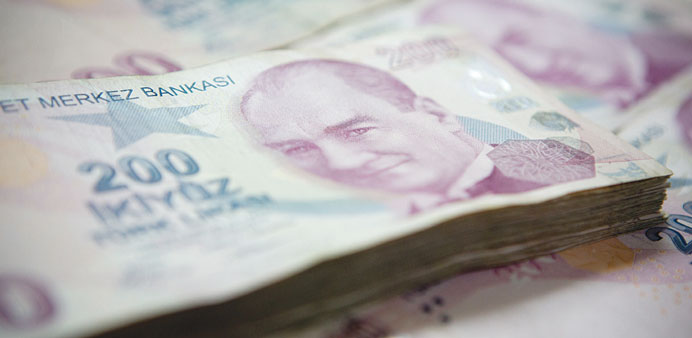Turkey’s central bank stepped up yesterday its defence of the lira, whose value has sagged amid a political crisis and the winding down of US monetary stimulus.
Central bank chief Erdem Basci said to combat volatility on the currency market it would step up its provision of liquidity by “injecting daily at least 450mn dollars per day until December 31.”
On Tuesday morning the lira had fallen to 2.097 to the US dollar, from 2.091 on Monday.
It rallied to 2.086 to the dollar after Basci’s comments.
Since the US Federal Reserve decided last Wednesday to modestly cut its monthly stimulus injections, the lira has fallen by around 3% against the dollar despite the Turkish central bank injecting $900mn.
As a leading emerging economy, Turkey has been one of the main beneficiaries of the Fed’s stimulus as US investors sought higher returns abroad.
It was also one of the countries worst hit earlier this year when the Fed signalled it plans to wind down the stimulus programme, with the lira tumbling by 15% against the dollar since the beginning of 2013.
The lira has also suffered as Turkey is embroiled in a political crisis amid a sweeping graft probe that has rocked the establishment and exposed bitter fault lines in the power base of Prime Minister Recep Tayyip Erdogan.
Turkey goes to polls next year for local elections in March and a presidential vote in June, and the central bank has been under pressure from the government to keep interest rates low to maintain economic growth.
However Turkey needs to keep foreign funds flowing in to cover its trade gap, which would argue for the central bank to raise interest rates.
The central bank has refused to raise its main policy rate, and Basci let it be understood yesterday he doesn’t intend to make any changes in the near future.
However Turkey’s central bank maintains a number of rates at which it provides financing to lenders, and has gradually lessened the amount of funding they can take at the cheaper policy rate.
Basci said the central bank plans to inject $100mn per day of liquidity into the market in January, but the last week the bank also warned if there was excessive volatility it could raise by 10 times its minimum daily foreign currency sale amount.

